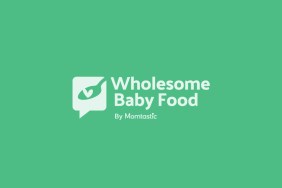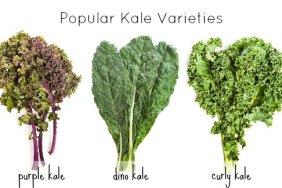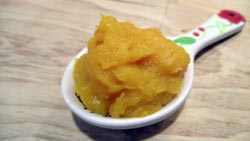Should I use Only Organic Foods to Make Baby Food? Is Organic Food Better for Making Baby Food?
You’ve decided to make your own baby food because you want to provide the freshest foods possible to your baby amongst other reasons. Now you are faced with the task of selecting, cooking and pureeing the very best of fruits, vegetables and meats. You may now be wondering if you should buy organic or non-organic foods.
Some people may tell you that you should use only organic foods for making your baby foods while others may tell you using non-organic, or a mix of both, is perfectly acceptable. The choice to make baby food organic is a personal one. For many, the choice to “go organic” is based on lifestyle, location, knowledge and quite possibly, on the cost factor of purchasing organic vs. non-organic foods.
It is obvious, and it really cannot be denied, that organic foods are healthier due to the lack of chemicals and synthetic pesticides. Buying and preparing organic foods for your baby will have great health advantages. Making organic baby food recipes for your growing baby will help to keep baby’s fragile system relatively free of chemicals and pesticides.
The advantage of organic baby food for infants
Here are a few simple reasons why making Organic baby food is a great choice:
![]() Pound for pound, a baby consumes more pesticides due to body size because pound for pound, a baby eats more fruits and vegetables than an adult does.
Pound for pound, a baby consumes more pesticides due to body size because pound for pound, a baby eats more fruits and vegetables than an adult does.
![]() Babies who eat Organic baby foods are not exposed to the levels of pesticides that are found in conventional foods.
Babies who eat Organic baby foods are not exposed to the levels of pesticides that are found in conventional foods.
![]() When serving “nitrate” vegetables, the levels of nitrates in Organics are reduced though not 100 percent eradicated (Nitrates are naturally occurring and farming without using nitrogen fertilizers does not eliminate nitrate concentration).
When serving “nitrate” vegetables, the levels of nitrates in Organics are reduced though not 100 percent eradicated (Nitrates are naturally occurring and farming without using nitrogen fertilizers does not eliminate nitrate concentration).
![]() Studies are now showing that Organic foods do have higher nutritional levels than do conventionally grown foods.
Studies are now showing that Organic foods do have higher nutritional levels than do conventionally grown foods.
![]() Organic food are not GMO foods. In order for a food to be certified Organic (according to U.S. standards) organic foods cannot be genetically modified.
Organic food are not GMO foods. In order for a food to be certified Organic (according to U.S. standards) organic foods cannot be genetically modified.
Organic foods are foods grown without chemical fertilizers or synthetic pesticides – a BIG advantage to Organic Foods
Many organic farmers are allowed to use pesticides and still comply with being “Organic”. The pesticides are those that occur naturally in the environment such as sulphur, nicotine and copper and in some instances, nitrogen.
Are the risks of these “natural” pesticides any lower than those pesticides that are manufactured and synthetic? There have been no reputable studies done at this point to tell us the exact risk levels of natural pesticides and fertilizers. However, common sense will tell us that it’s healthier to eat an apple grown with compost fertilizers and natural pesticides than it is to eat an apple that has been grown with a chemical pesticide or fertilizer.
The advantage to Organic foods is that chemical and synthetic pesticide contamination is eliminated. Buying Organic produce for baby food making is the best choice if you are able to obtain and afford Organic foods.
Should I still make homemade baby food if I cannot afford or cannot access organic foods?
Many parents use organic foods solely for baby food ingredients while many parents who make their own baby food have never even bought an organic food item. Making your own baby food has so many benefits along with the nutritional benefits. With all this in mind, if you cannot afford the oftentimes very high price of organics, it is still worth using fresh fruits and vegetables that are non-organic for making your baby food.
Don’t let people tell you that you are wasting your time if you don’t use Organics. Don’t let the inability to afford Organics or the unavailability of them, stop you from cooking up fresh and wholesome baby foods. Using fresh and well cleansed Non-Organic fruits and vegetables and whole grains is just as acceptable.
The important things to remember are that you are feeding your baby fresh foods, developing healthy eating habits very early on and are getting more nutritional value per ounce than were you to use jarred foods.
If there are anay foods you should buy organic when making homemade baby food, buy the organic versions of the “Dirty Dozen” as well as dairy products
Do Organic Foods Have a Higher Nutritional Value?
What many wonder about is this, “Do Organic Foods have a higher nutritional value?”. Until recently (the year 2007) there had been few studies done to suggest there is an increase in the nutritional quality of Organic foods.1 Regardless, the irrefutable truth is that organics are better for our bodies. Organic foods taste better, have almost zero levels of synthetic pesticide/chemical contamination, look better and are also better for our fragile environment.
New study shows that some Organic foods do indeed contain more nutrients than conventional foods. updated 05 November 2007
Over the years, various studies have been done on Organic foods. These studies have set out to prove that Organic foods have more nutrients than those foods grown with “conventional” fertilizers and pesticides. It makes sense that foods grown organically would have more nutrients as chemicals are not present to alter the nutrients within the soil. This new study, an EU funded project called the Quality Low Input Food (QLIF) project, is the biggest ever to research the pros and cons of organic farming and food. It was conducted at the Tesco Centre for Organic Agriculture based at Newcastle University, UK.
The new study shows that organic milk has 60 to 80 percent more nutrients in the summer than conventional milk, and 50 to 60 percent more in the winter.
- Organic milk also has higher levels of vitamin E. Organic cheese can have up to twice as many nutrients than conventional varieties. Organic wheat, tomatoes, potatoes, cabbage, onions and lettuce had between 20 and 40 per cent more nutrients.
What does this mean for your baby? If you purchase Organic produce and other Organic foods, your baby will not only be exposed to zero to lower levels of pesticides, your baby may indeed benefit from more nutrients. Homemade baby food is said to offer more nutrients due to its lack of over-cooking and processing. Using Organic foods will boost up more nutrients in homemade baby foods. Read the press release and visit the QLIF site.What “Organic” labels really mean from Consumer Reports
Despite the fact that shoppers pay, on average, 50 percent more for organic food, organic products are one of the fastest-growing categories in the food business. Nearly two-thirds of U.S. consumers bought organic foods and beverages in 2005, up from about half in 2004.
While some buy organic to support its producers’ environmentally friendly practices, most are trying to cut their exposure to chemicals in the foods they eat. So what can you count on when you buy organic?
100% Organic
If the product is labeled “100 percent organic” it means that, by law, there are no synthetic ingredients. Also, production processes must meet federal organic standards and must have been independently verified by accredited inspectors.
Organic
If the label says, simply, “organic,” no less than 95 percent of the ingredients must have been organically produced.
Made with Organic Ingredients
If a product is labeled “Made with Organic Ingredients,” you can be sure that at least 70 percent of its makeup is organic. The remaining ingredients must come from the U.S. Department of Agriculture’s approved list.
All Natural – Natural
Labels that specify “natural” or “all natural” do not mean organic.
There is no standard definition for these terms, except when the terms are applied to meat and poultry products, which the USDA defines as not containing any artificial flavoring, colors or synthetic ingredients.
Free Range
The terms “free-range” or “free-roaming” are similarly meaningless. U.S. government standards are weak. The rule for the label’s use on poultry products, for example, is merely that outdoor access be available for “an undetermined period each day.”
Labeling seafood “organic” is also misleading, since the USDA has not yet developed organic-certification standards.
Also, organic meat, poultry, eggs and dairy are sensible buys. What you’ll get is minimized exposure to potential toxins in non organic feed. You’ll also avoid the results of production methods that use daily supplemental hormones and antibiotics, which have been linked to increased antibacterial resistance in humans.
Organic baby food is another safe bet. Children’s developing bodies are especially vulnerable to toxins, and they may be at risk for higher exposure. Baby food is often made up of condensed fruits or vegetables, potentially concentrating pesticide residues.
Copyright 2006, Consumers Union From the editors at Consumer Reports
Resources & Learning More:
Organic Milk Report & Scorecard
Center for Global Food Issues ‘Negative Campaigning’ for the New U.S. Organic Food Standards’
Organic Standards Legislation as reviewed by the Washington Post
![]() This site complies with the HONcode standard for trustworthy health information:
This site complies with the HONcode standard for trustworthy health information:




